August 14, 2025
Unraveling the Connection Between Vitamin D and Autism Spectrum Disorder
Recent research highlights a compelling association between vitamin D levels and autism spectrum disorder (ASD). Children with ASD are often found to have markedly lower serum vitamin D levels than their neurotypical counterparts, suggesting a potential role for vitamin D in neurodevelopmental processes. This article explores the scientific, biological, and epidemiological evidence linking vitamin D to autism, examining how deficiency may influence development, severity, and possible therapeutic interventions.
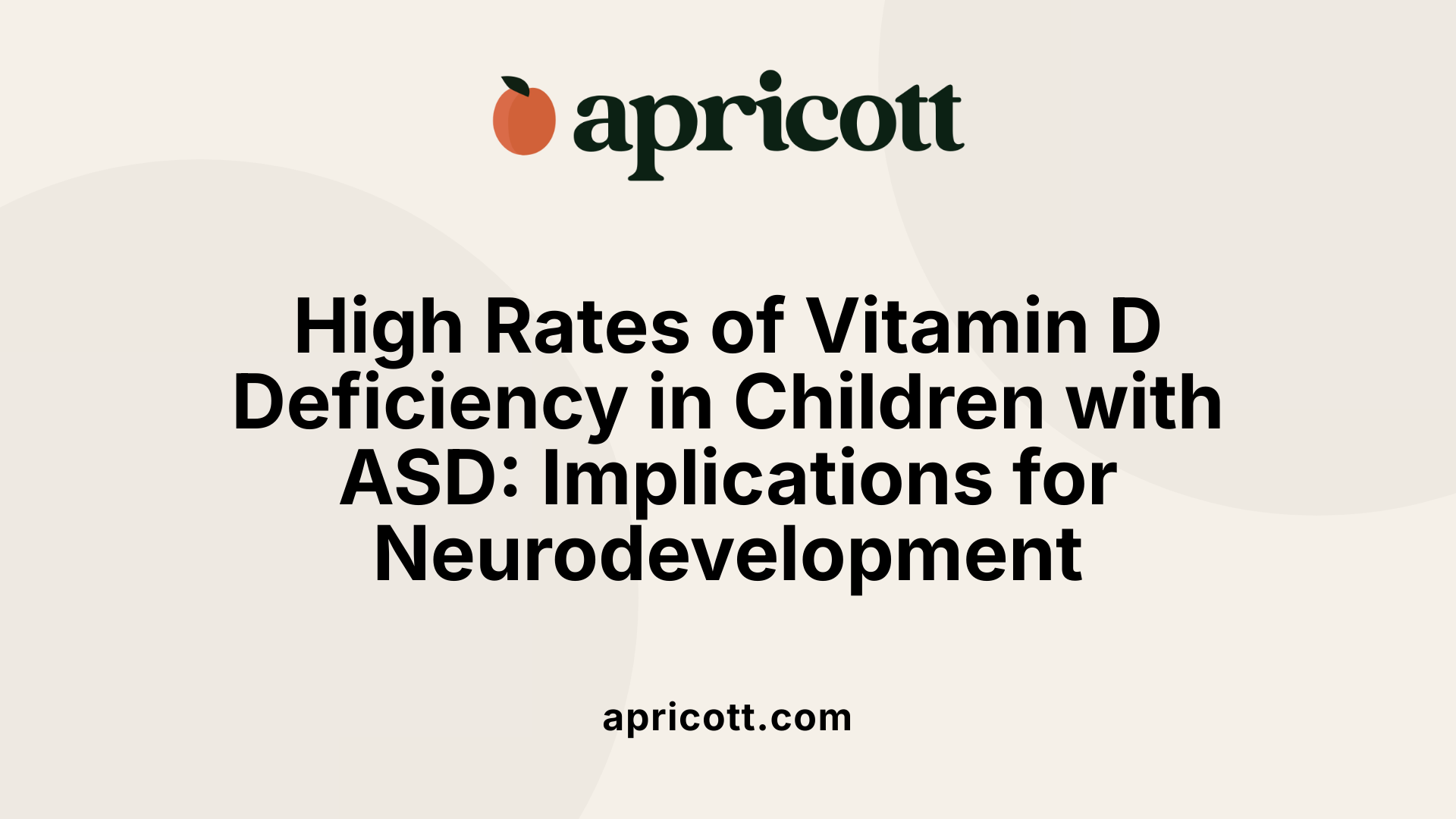
Research shows that children with ASD typically have lower vitamin D levels compared to their neurotypical peers. Studies from various countries, including Turkey and Iran, report high rates of vitamin D deficiency among children with ASD—up to 95% in some cases—and many have levels below 20 ng/mL, which is considered deficient.
This deficiency appears to be linked with more severe ASD symptoms. Vitamin D influences brain development by affecting neuronal growth, neurotransmitter synthesis, immune function, and gene regulation—all processes relevant to ASD. Animal studies support this connection; for example, vitamin D deficiency in pregnant mice led to offspring exhibiting behaviors similar to ASD and structural brain changes.
Some clinical trials demonstrate that supplementing vitamin D can reduce autism severity and improve behavioral scores like the CARS and ABC, especially in younger children and with early intervention. However, many studies have mixed results, partly due to small sample sizes, short follow-up periods, and methodological differences.
Importantly, recent genetic and epidemiological research suggests that vitamin D deficiency may not be directly causal in ASD. Mendelian randomization studies have found no definitive causal link, implying that low vitamin D levels could be a consequence of ASD-related behaviors, such as limited outdoor activity, rather than a cause.
In conclusion, while low vitamin D levels are common in children with ASD and might influence symptom severity, current evidence indicates that deficiency could be an associated factor rather than a direct cause. Further large-scale, long-term studies are necessary to determine whether vitamin D supplementation can serve as an effective intervention in managing ASD symptoms.
Vitamin D plays a significant role in the development and functioning of the brain. It influences neurodevelopment through multiple pathways, which may impact the risk and severity of autism spectrum disorder (ASD).
One crucial aspect is its ability to regulate brain development processes such as neuronal differentiation, proliferation, and synaptic plasticity. These processes are fundamental for creating healthy neural networks essential for cognitive and social functions.
Vitamin D also modulates neurotransmitter systems that are often abnormal in children with ASD. Specifically, it affects serotonergic, dopaminergic, and oxytocinergic pathways, which are linked to social communication, mood regulation, and stereotyped behaviors.
In addition to its role in neurotransmission, vitamin D exerts anti-inflammatory and immune-modulating effects. It decreases pro-inflammatory cytokines and oxidative stress markers that are frequently elevated in ASD, potentially reducing neuroinflammation that may contribute to neurodevelopmental disruptions.
Genetically, vitamin D influences gene expression by binding to vitamin D receptors (VDR) in the brain. This regulation can affect genes involved in brain structure and function, some of which are associated with increased ASD vulnerability.
During critical periods of fetal development, adequate vitamin D levels are essential for proper brain architecture. Animal studies suggest that prenatal deficiency may alter testosterone levels in male brains and impact neural circuitry, increasing ASD risk.
Overall, the biological mechanisms connecting vitamin D to neurodevelopment underline its potential importance in shaping neural pathways involved in ASD. Both epidemiological evidence and experimental models support the hypothesis that sufficient vitamin D levels during pregnancy and early childhood are vital for optimal neurodevelopment, potentially lowering the severity or risk of ASD.
Numerous population studies have identified a notable association between vitamin D deficiency and autism spectrum disorder (ASD). Children with ASD consistently show lower serum vitamin D levels compared to typically developing peers, with research from various countries indicating high rates of deficiency — in some cases, over 75% of affected children have inadequate vitamin D levels.
Maternal vitamin D status during pregnancy also plays a significant role. Studies reveal that higher prenatal vitamin D levels are linked to a decreased risk of ASD in offspring. Particularly, low maternal 25-hydroxy-vitamin D (25(OH)D) levels during pregnancy have been associated with increased ASD prevalence in children, suggesting that early vitamin D deficiency can influence neurodevelopmental trajectories.
The influence of seasonal and geographic factors further supports this connection. Regions with less sunlight exposure, especially during winter months, often report higher incidences of autism, aligning with the understanding that sunlight is a primary source of vitamin D synthesis in the skin. These seasonal variations, combined with data showing that low vitamin D levels are more common in higher latitudes, reinforce the hypothesis that insufficient vitamin D exposure is linked to autism risk.
Animal models provide additional evidence, demonstrating that maternal vitamin D deficiency leads to structural brain changes and behavioral traits similar to ASD in offspring. These findings suggest a neurobiological basis for the observed epidemiological patterns.
While some clinical trials and meta-analyses indicate that vitamin D supplementation can improve core autism symptoms, research results are mixed. Nonetheless, the existing evidence points toward a potential causal link whereby vitamin D deficiency during critical periods of brain development may contribute to the pathogenesis of ASD.
Overall, epidemiological data underscore the importance of adequate vitamin D levels in early development and support ongoing research into vitamin D’s preventive and therapeutic roles in autism spectrum disorder.
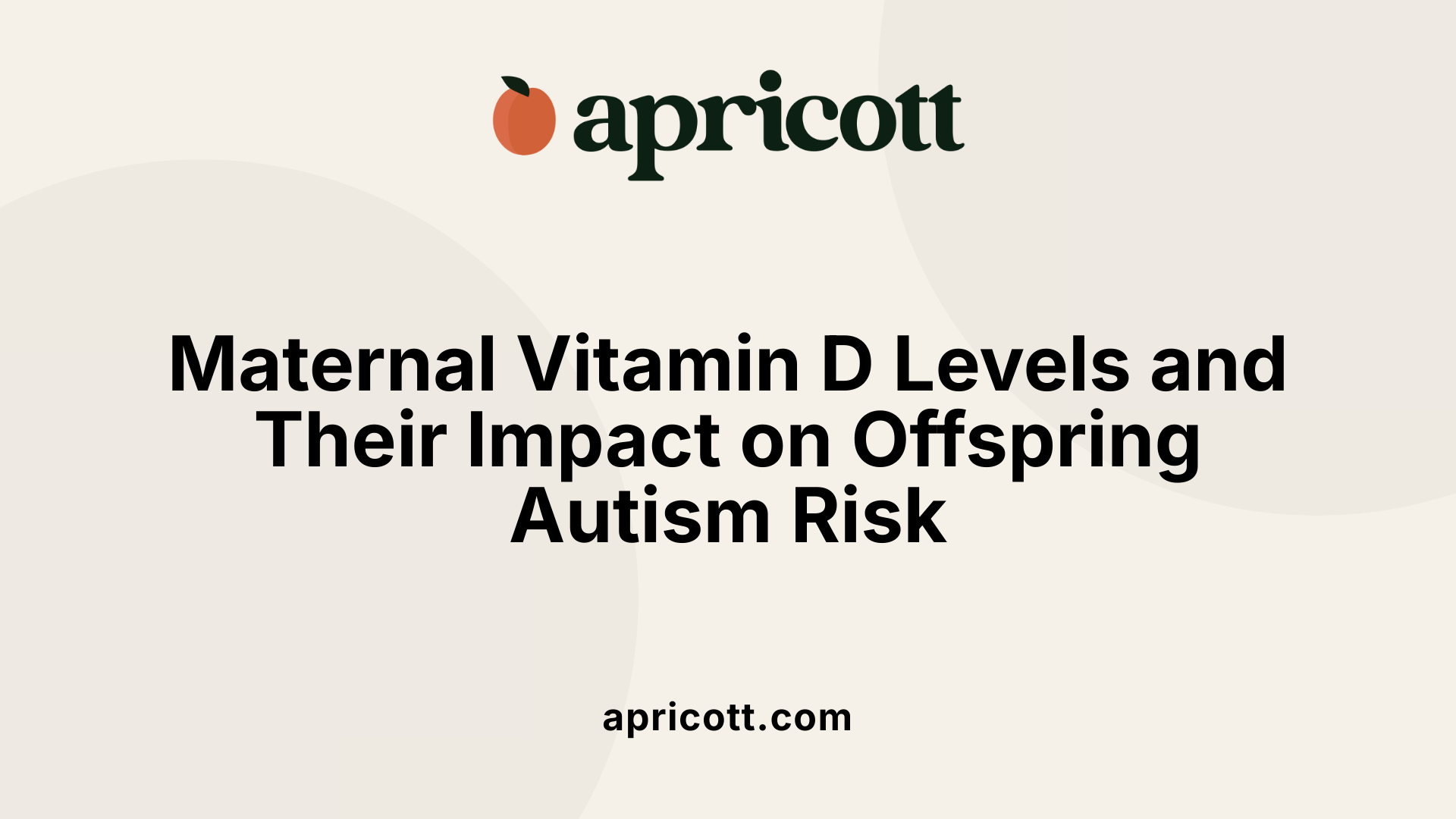
Research shows a notable connection between vitamin D levels in pregnant women and the likelihood of their children developing autism spectrum disorder (ASD). Several large population-based studies reveal that low maternal vitamin D levels—specifically below 30 nmol/L—are linked to a higher risk of ASD in the offspring. These deficiencies increase the odds of autism by as much as 2.5 times.
Conversely, maintaining adequate vitamin D levels during pregnancy appears to offer a protective effect against ASD. Higher vitamin D status in mothers correlates with a decreased risk of their children developing autism.
Certain systematic reviews and meta-analyses suggest a dose-response relationship. This means that for every 10 ng/mL increase in maternal vitamin D, there is approximately a 19% reduction in the risk of ASD. These findings underscore the importance of maternal vitamin D in fetal brain development.
Animal studies support these observations, showing that vitamin D deficiency during pregnancy can lead to changes in brain structure and function associated with autism.
Given this evidence, promoting sufficient vitamin D intake during pregnancy may be a useful strategy for reducing ASD risk. However, more research is needed to determine optimal supplementation doses and timing.
The association between maternal vitamin D levels and ASD risk emphasizes the potential benefits of prenatal vitamin D supplementation. Ensuring pregnant women maintain adequate vitamin D status could support healthy neurodevelopment in the fetus and potentially lower the chances of autism.
Healthcare providers should consider monitoring vitamin D levels during pregnancy and recommend appropriate supplementation when necessary. Nonetheless, guidelines for safe and effective vitamin D supplementation in pregnancy should be established through further clinical research.
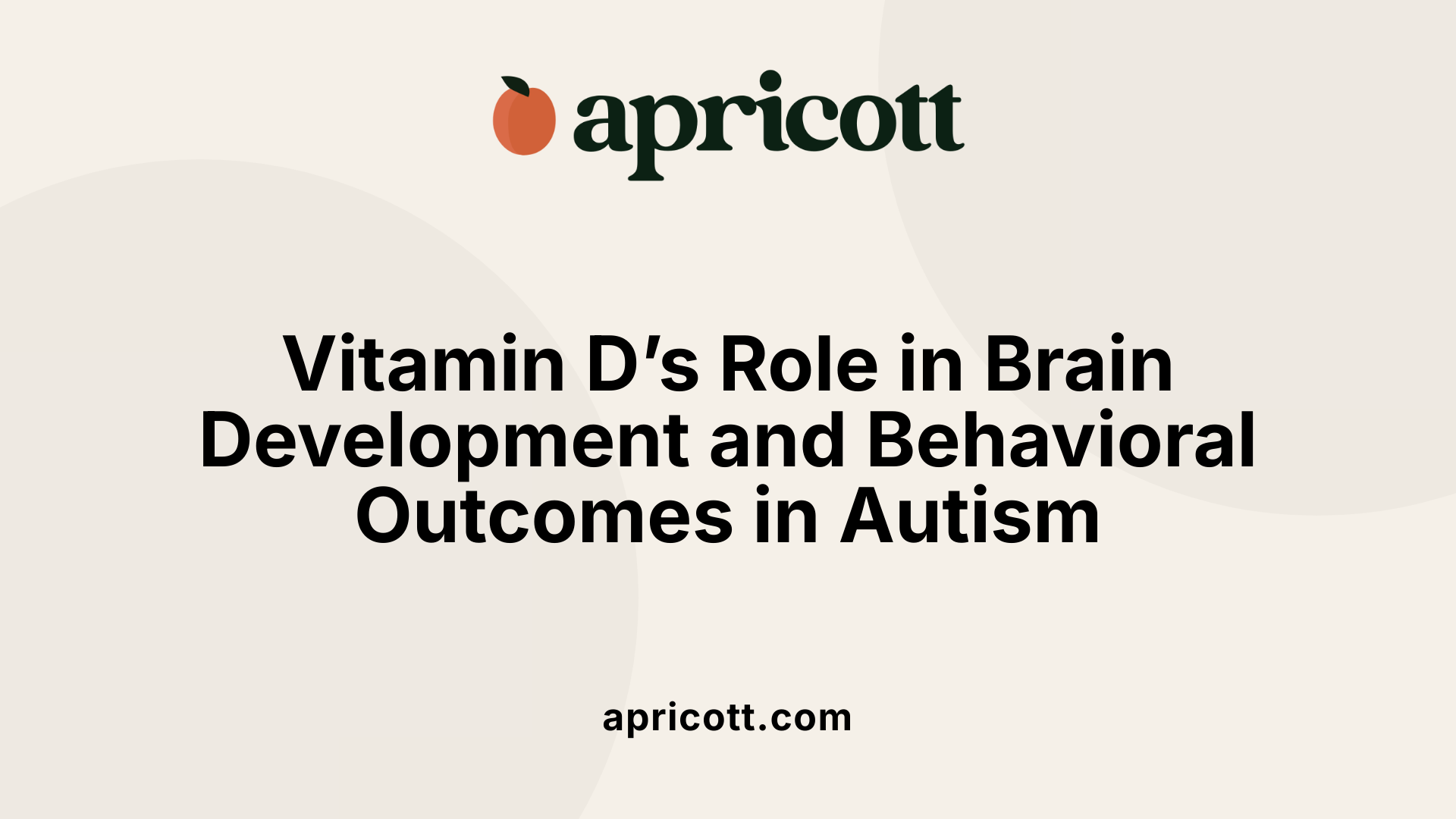
Vitamin D plays a crucial role in brain development and function. It regulates gene expression, promotes neuronal proliferation, and supports synaptic growth. Additionally, vitamin D influences the synthesis of neurotransmitters such as serotonin and dopamine, vital for mood, behavior, and cognition.
Research has shown that children with autism spectrum disorder (ASD) tend to have lower serum vitamin D levels compared to their neurotypical peers. Prenatal vitamin D deficiency is linked to an increased risk of ASD-like symptoms in offspring, suggesting that adequate vitamin D during pregnancy is essential for proper neurodevelopment.
Animal studies further reinforce this connection. Vitamin D deficiency in animal models results in structural brain changes and behaviors similar to ASD. Conversely, supplementing vitamin D during pregnancy has been observed to prevent ASD-like traits in offspring.
In clinical settings, some trials have indicated benefits of vitamin D supplementation for children with ASD. Improvements have been noted in social behaviors, communication, and stereotyped movements, although results are not entirely consistent across all studies. Variations in age, dosage, and duration of supplementation may influence outcomes.
Overall, the evidence suggests that vitamin D influences neurodevelopment and behaviors associated with autism through multiple biological pathways. While promising, larger and more rigorous studies are required to establish definitive causality and to optimize intervention strategies, including timing and dosage of supplementation.
For more information, searching "Vitamin D and neurodevelopment in autism" can provide additional insights into ongoing research efforts and emerging findings in this field.
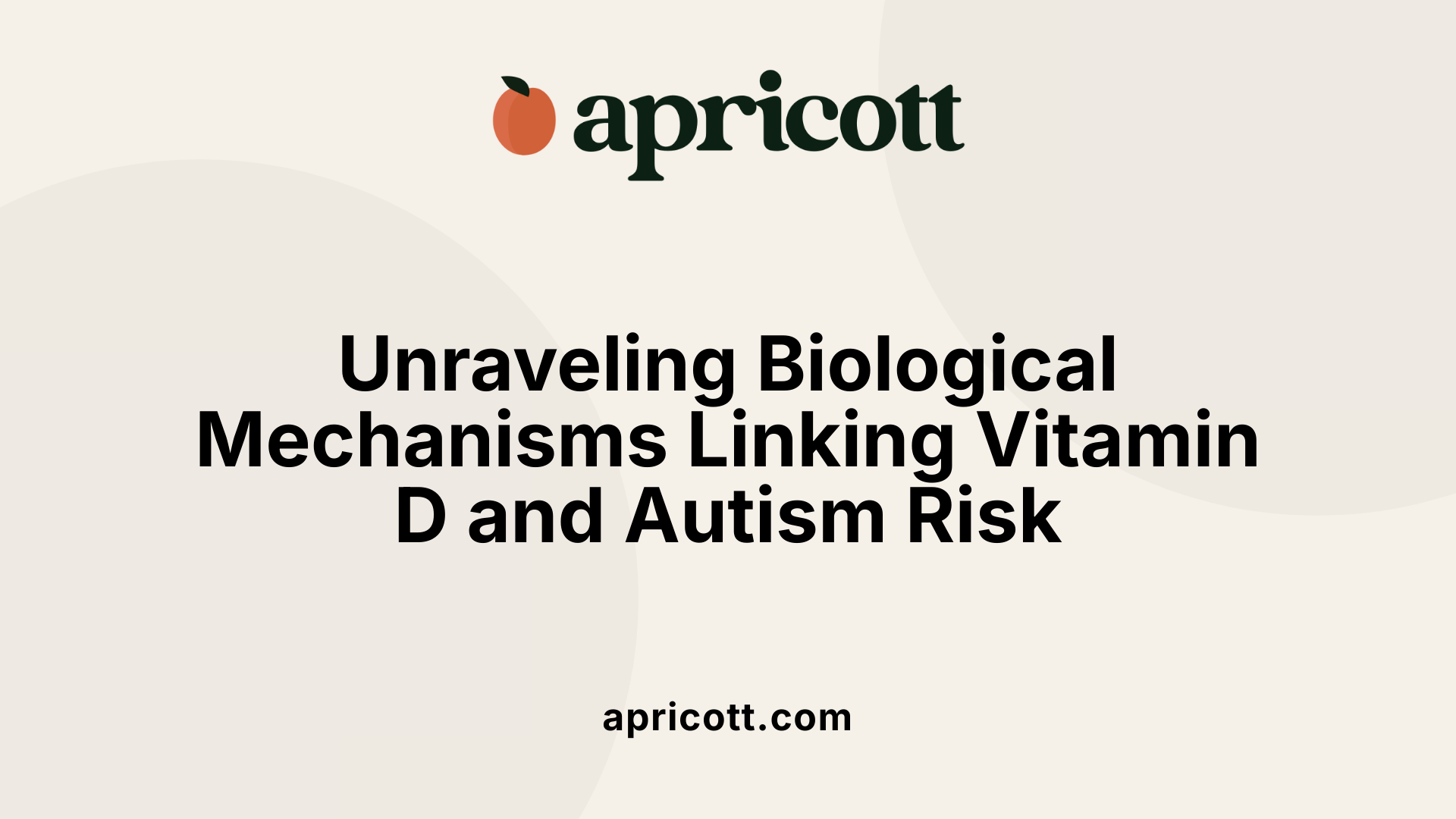
Vitamin D plays a vital role in brain development and function, influencing a range of neurobiological processes that could impact autism spectrum disorder (ASD). It regulates gene expression, which affects neuronal differentiation, proliferation, and synaptic plasticity—fundamental aspects of brain maturation.
Moreover, vitamin D modulates neurotransmitter systems such as serotonin, dopamine, and oxytocin, that are integral to social behaviors, mood regulation, and stereotypical actions typical of ASD. Its anti-inflammatory properties help decrease cytokine production and oxidative stress, both of which are elevated in some individuals with ASD.
The neuroprotective effects of vitamin D extend to impacting neurotrophic factors essential for neuron survival and growth. It also influences steroid hormone synthesis, particularly during fetal development, affecting pathways that involve sex hormones and potentially explaining higher ASD prevalence in males.
Research from animal models indicates that vitamin D deficiency during pregnancy can alter brain structure and connectivity, elevating the risk of ASD traits. This biological plausibility is reinforced by epidemiological data linking prenatal vitamin D deficiency to increased ASD risk. Overall, these complex interactions suggest that adequate vitamin D levels during critical periods of neurodevelopment could reduce the severity or likelihood of ASD.
Current research indicates that vitamin D supplementation may offer some advantages for individuals with autism spectrum disorder (ASD). Multiple studies have shown that children with ASD often have lower vitamin D levels compared to their neurotypical peers. Supplementing vitamin D has been associated with reductions in ASD core symptoms such as social deficits, repetitive behaviors, and attention issues.
Biologically, vitamin D influences neurodevelopment through its anti-inflammatory properties, promotion of neurotrophin production, and regulation of neurotransmitters like serotonin. These mechanisms align with pathways involved in ASD, supporting the idea that correcting vitamin D deficiency might help alleviate some symptoms.
Meta-analyses of randomized controlled trials (RCTs) lend further support. A notable review of three studies involving 203 children found that vitamin D supplementation significantly improved scores on behavioral scales like the Child Autism Rating Scale (CARS) and Social Responsiveness Scale (SRS). These improvements suggest a modest but meaningful alleviation of ASD symptoms.
In terms of safety, vitamin D supplements are generally well-tolerated, with few reported side effects. However, the evidence, while promising, is not yet conclusive. Variability across studies in dosage, treatment duration, and assessment methods means that results are mixed. Many studies also have small sample sizes and short follow-up periods.
Overall, the biological plausibility and current findings support the potential benefits of vitamin D supplementation in ASD. Still, more extensive, long-term trials are needed to determine optimal dosing, timing, and the full scope of its benefits as part of an integrated treatment plan.
Vitamin D supplements are generally considered safe and well-tolerated when used appropriately. Most children and adults experience few side effects, with toxicity being rare. Overdose, however, can lead to elevated calcium levels in the blood, resulting in symptoms such as nausea, vomiting, weakness, and kidney issues. To prevent adverse effects, it's important to adhere to recommended dosages.
Dosing of vitamin D varies based on age, health status, and baseline vitamin D levels. For children with ASD, clinicians often consider doses ranging from 300 IU/day to higher doses in cases of deficiency. For example, some studies used daily doses up to 6000 IU, but such high doses should only be administered under medical supervision.
Research suggests that continuous vitamin D supplementation may be necessary to maintain elevated serum levels and sustain potential benefits in reducing ASD severity. Because vitamin D levels can decline over time due to various factors like limited sunlight exposure and dietary insufficiency, ongoing supplementation and regular monitoring of serum 25(OH)D levels are recommended to ensure optimal levels.
Ensuring a balanced approach to dose, regular assessment, and consultation with healthcare providers can help maximize safety and effectiveness in using vitamin D as part of supportive therapy for children with ASD.
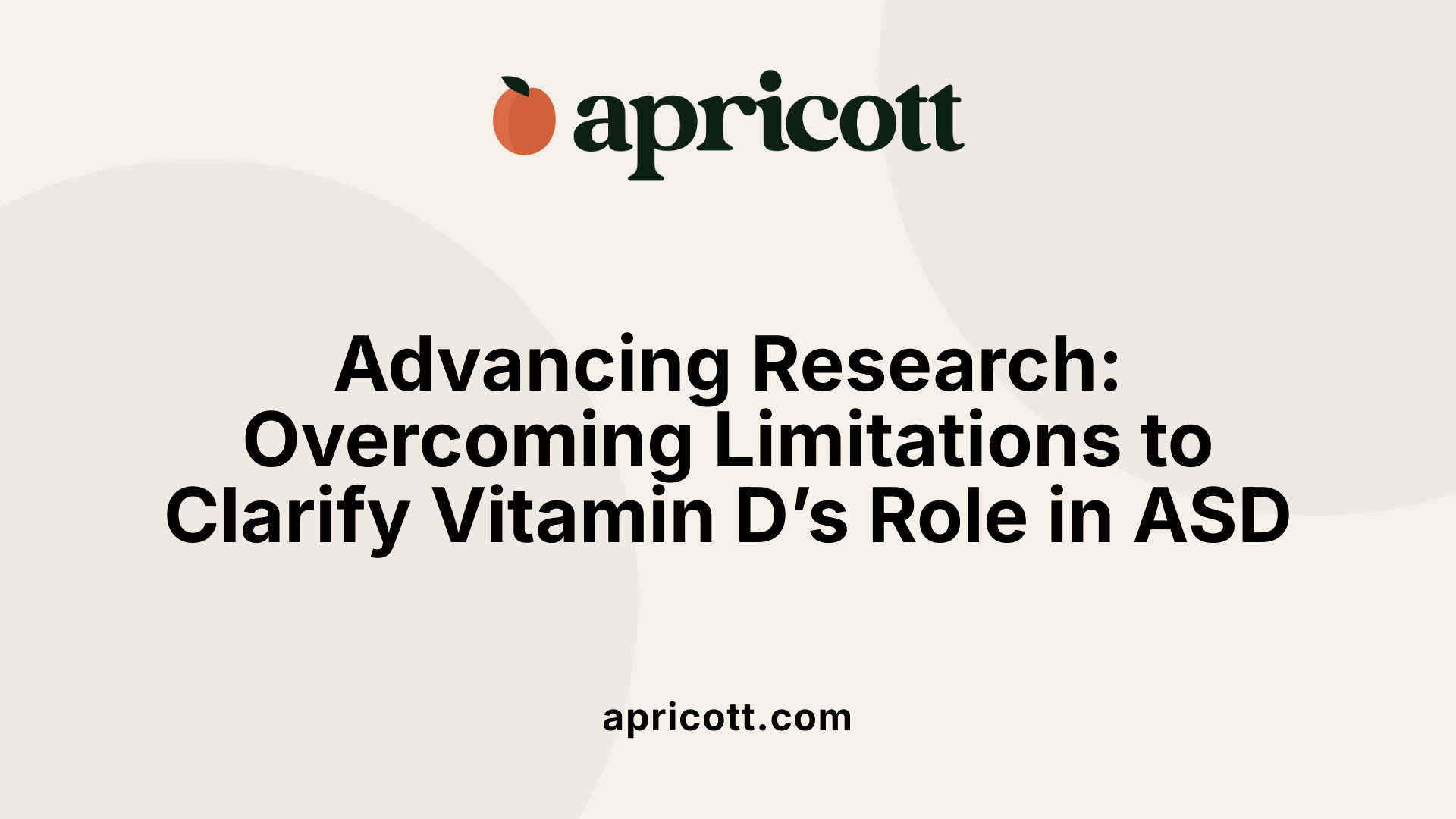
Many existing studies on vitamin D and autism face limitations related to small sample sizes and inconsistent methodologies. Small sample sizes reduce the statistical power and make it difficult to draw definitive conclusions about the efficacy of vitamin D supplementation. Variations in how studies measure vitamin D levels, autism severity, and progress also contribute to difficulties in comparing results.
While some research indicates that vitamin D supplementation can reduce autism symptoms, there is a need for larger, long-term clinical trials to confirm these findings. Extended follow-up periods are crucial to understanding whether benefits are sustained over time and to assess potential long-term effects or adverse outcomes.
Emerging evidence suggests that individual factors—such as genetic variations, age at intervention, and baseline vitamin D levels—may influence response to supplementation. Future studies should explore personalized approaches, tailoring vitamin D regimens based on genetic and metabolic profiles, to optimize treatment outcomes.
| Aspect | Current Status | Future Needs | Impact |
|---|---|---|---|
| Study size | Mostly small, limited generalizability | Larger, diverse populations | More reliable data |
| Duration | Often short-term | Long-term follow-up | Understanding sustained effects |
| Personalization | Lacking | Targeted interventions based on genetics and age | Enhanced efficacy |
Research advances are essential to establish standardized guidelines for vitamin D use in ASD. Rigorous, large-scale, and personalized studies will help determine who may benefit most and how to implement supplementation effectively.
Given the consistent findings that children with autism spectrum disorder (ASD) often have lower vitamin D levels compared to their neurotypical peers, screening for vitamin D deficiency should be considered a standard part of clinical assessment. Studies indicate that over 60% of children with ASD exhibit vitamin D insufficiency or deficiency, especially in regions with limited sunlight exposure or dietary intake. Early detection can facilitate timely intervention, which might influence ASD severity and overall neurodevelopment.
Research supports the idea that vitamin D supplementation could play a role in alleviating ASD symptoms. Several studies, including meta-analyses, report that supplementation is associated with improvements in behavioral measures and reductions in severity scores like CARS and ABC. Although results are mixed and more extensive, long-term research is needed, initial evidence suggests that supplementation is safe and well-tolerated, with minimal side effects.
Clinicians should consider including vitamin D status assessment in the comprehensive management plan for children with ASD. For those found deficient, appropriate vitamin D supplementation can be recommended to potentially improve behavioral outcomes. It is also advisable to promote adequate sunlight exposure and dietary intake of vitamin D-rich foods. Continuous monitoring and follow-up are essential to maintaining optimal levels and assessing the ongoing impact on ASD symptoms. As the research evolves, vitamin D supplementation stands as a promising adjunct in holistic autism care.
While the connection between vitamin D and autism is supported by a growing body of evidence pointing to lower vitamin D levels in individuals with ASD and potential benefits of supplementation, definitive causal links remain unproven. The neurobiological plausibility, epidemiological associations, and preliminary intervention results highlight the importance of considering vitamin D status in the context of neurodevelopment and autism. Clinicians are encouraged to monitor vitamin D levels, especially during pregnancy and early childhood, given its safety and potential for positive impact. Future well-designed, large-scale research is essential to establish standardized protocols and clear guidelines, ultimately integrating vitamin D assessment and correction as a part of comprehensive autism spectrum disorder management.